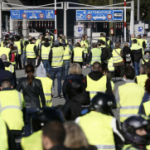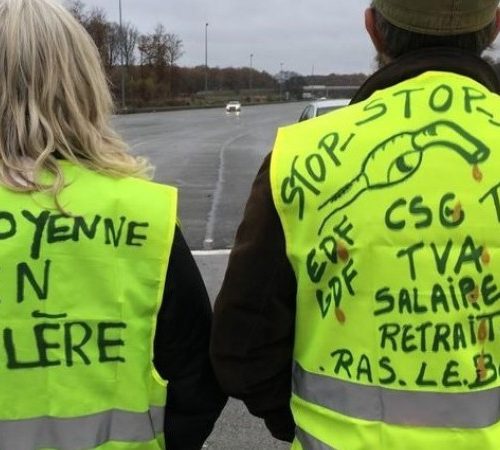THE YELLOW VESTS EXPRESS THE ANGER OF A WHOLE PEOPLE – In mid-Nov 2018, raised taxes on fuel triggered the Yellow Vests movement. This was the little drop that caused an overflow of anger in the popular classes, those hit hardest by the increased austerity measures of the Macron’s government.
The Yellow Vest (Gilet Jaunes) movement has often been able to innovate, diversify, espouse other sectors in struggle and include in its demands those of a general interest. Although wary of the parties, of the trade unions and of the whole political class, it has raised a lot of new questions concerning the future, and how to go about making society change.
In only a few weeks, the scale of this movement became enormous. That was because the population supports its rebellion and sees it as legitimate. And this, in spite of social outbursts and acts of violence, and the intervention of groups of wreckers whose every act made the headlines in the medias.
The Yellow Vests started with the refusal to pay extra for fuel, but they soon adopted demands for social justice, taxation justice, democratic justice, ecological justice. Their movement attracted the college students opposed to education reforms, the latter announcing yet more inequality, elitism and relegation for the young in the popular areas. Viciously hit by new taxes on their pensions, the retired people joined in too. They were followed by workers facing job losses, enterprise closures and work precariousness.
The movement was reinforced when Town Halls and the communes – themselves the victims of the State’s cuts – set out registers for people to list their grievances and set out their proposals for change.
A movement with new forms of action:
The movement of the Yellow Vests grasped early that, to be heard, it had to use new types of actions and paralyse the country. The movement took aim at the economic and financial sectors, the symbols of the market economy, the people with inordinate fortunes. Obstacles were put in the way of big distribution, trade in luxury goods, the big banks, the multinationals that pollute and poison the planet. Traffic roundabouts were occupied. Toll-booths and motorways were taken over and free access to the roads was given to everyone.
When Emmanuel Macron said that his fuel tax was the so-called ‘correct’ way to deal with climate change, the Yellow Vests replied that the big polluters must pay: those who use kerosene in their aeroplanes and those who use heavy oil for cruise and container ships. These people rot the air with their CO2 emissions and cause grave illnesses in the population. The Yellow Vests give a practical demonstration that you cannot have an ecological transition without a social one.
Actions like their’s challenge the structures of our unjust and unequal society which favours the rich at the expense of the poorest. Such a society has nothing to do with the principles of the Republic and the values of Liberty, Equality, Fraternity. These words are inscribed on the gables of Town Halls and public buildings, but they lost all meaning in a society flouting liberty, where solidarity is an offence and where people feel despised and attacked in their dignity
Ever since he became President, Emmanuel Macron’s policy has been one of brutal reforms at all levels. Social misery is deepening, and the benefits are for the enterprises and the rich. The labour code has been scrapped, the housing subsidies have been cut, and social housing destroyed. The subsidies for employers to recruit have stopped and the social protections have been curtailed. The State of Emergency is now the new normal. Repressive immigration laws are constantly evolving. The coming reforms seek to abolish the public sector services to turn the country over to private investors.
The movement of the Yellow Vests is very diverse and contradictory, but the clear aims which it expresses go well beyond those of its origins. A collective dynamic draws it towards wider vistas, the need for a better minimum wage included, the wages to rise with the cost of living, rent controls and the reinstatement of the wealth tax [1]. It has also laid political bases in matters of democracy, in favour of citizen’s sponsored referendums, the Senate to be replaced by citizens’ assemblies and the re-founding of the Republic.
A mobilisation outside parties and unions:
The Gilet Jaunes have taken the political parties and the trade unions aback. Not greatly supported by workers and employees, the Unions fought for months against the Labour Law reform, as well as for more social justice and purchasing power. They won nothing from the government however, whilst in their own way, the Gilets Jaunes reject the capitalist system too. They do not speak on behalf of any political organisation, but they include demands in the interests of everyone in their programme.
There is no doubt that the Gilets Jaunes’s movement does not come out of nothing. It comes out of the political and trade union struggles that happened and continue to happen all over the country. But in the way they function, the Gilets Jaunes display qualities that the left-wing parties and the unions do not have. The latter got themselves bogged down when they chose to ‘vote Macron against Le Pen’ in the second round of the 2017 presidential elections. This trapped them in their own contradictions.

The trade unions are rather left behind because they cannot treat the Gilets Jaunes as allies. The unions are hindered in this matter by their vertical and bureaucratic way of functioning. The Gilets Jaunes have the advantage of their horizontal, democratic and solidary forms. They make their experience of power in the streets where they take everyone into account. They make decisions through majorities and popular assemblies not unlike those of Nuit Debout [2] in its time. Many Jaunes insist on having ‘no representatives’, and that is to avoid being utilised and being buried. Their slogan is “Power to the people, by the people, for the people”. Where spokespersons are needed, they must be persons of integrity and not come from parties or unions.
In the present context, views will have to converge more. It will be a political necessity if another society is to be built, a more egalitarian society, more democratic and responsive to the needs of the majority of the population. This is going to be very complicated if the left parties and the trade unions do not change the way they operate. The union leaders and their apparatchiks eye the Gilet Jaunes with suspicion – but on the ground, the political, trade union and associative militants are on the side of the Gilet Jaunes. On 14 December 2018, the CGT organised a day of strikes and demonstrations. The result was not very great, but the two sides managed some contacts and exchanges between them.
Three weeks after the start of the Jaunes’ movement, the leaders of the Trade Union Confederations [3] tried to bring out a joint declaration. There was no unanimity however. The trade union group Solidaires [4] refused to sign. It described the declaration as top-down and above the heads of people. In its opinion, the declaration was “a posture of union unity which does not mention the violence suffered by protestors over many years, and even worse over the last weeks” [5].


















